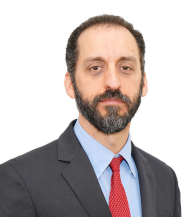Research Staff
A | B | C | D | E | F | G | H | I | J | K | L | M | N | O | P | Q | R | S | T | U | V | W | X | Y | Z
Harry Apostoleris

Harry Apostoleris is a Technical Leader in the Energy Systems and Climate Analysis group, based in EPRI's Dubai office. Harry's research focuses the development and economic analysis of net-zero transition pathways for national energy systems, with a primary emphasis on Middle Eastern nations and the Gulf region in particular.
Prior to joining EPRI, Harry worked as a Senior Researcher for the Dubai Electricity & Water Authority (DEWA) where he was responsible for energy system modeling, technoeconomic assessments of emerging technologies and decarbonization pathway development within DEWA's R&D division. He previously spent 8 years in Abu Dhabi completing a Masters, PhD and postdoctoral assignment at the Masdar Institute of Science & Technology (now Khalifa University) where he focused on the optical design of solar concentrator systems and on cost modeling and projections for commercial solar energy systems. He holds a bachelor's degree in Physics from Swarthmore College.
Robin Bedilion

Robin Bedilion is a Principal Team Lead in the Energy Systems and Climate Analysis group at EPRI. Ms. Bedilion conducts technoeconomic analyses and cost and performance research evaluating current and emerging power sector technologies to support utility resource planning and EPRI's energy-economy modeling efforts.
Prior to joining the Energy Systems and Climate Analysis group, Ms. Bedilion was most recently in EPRI's Renewable Generation program, where her research focused on Renewables Economics, including current and projected capital, O&M, and levelized costs of electricity of renewable generation resources, as well as emerging technology trends and business models. She also worked in EPRI's Technology Innovation program where she was responsible for coordinating and conducting EPRI's Thought Leadership activities and was involved in EPRI's Innovation Scouting activities. She joined EPRI in 2007 as a project engineer in EPRI's Generation sector, supporting engineering and economic evaluations under EPRI's Technical Assessment Guide (TAG), CoalFleet, and Renewables programs.
Ms. Bedilion earned a bachelor's degree in mechanical engineering from Santa Clara University and a master's degree in mechanical engineering with a focus on energy systems from Stanford University.
Recent Publications
- Robin Bedilion and Heather Feldman, 2023. EPRI's Research and Development to Address Supply Chain for Today and the Energy Transition. EPRI, Palo Alto, CA. 3002027966
- Robin Bedilion, et al., 2022. Understanding Generation and Storage Technology Supply Chain Risks and Needs to Support Electric Utility Sector Decarbonization. EPRI, Palo Alto, CA. 3002023228
John Bistline
Dr. John Bistline is a Senior Program Manager in the Energy Systems and Climate Analysis Group at EPRI. His research analyzes the economic and environmental effects of policy and technological change to inform energy systems planning and company strategy. Dr. Bistline's current research activities examine impacts of federal and state energy and environmental policies, power systems decarbonization, renewables integration, and net-zero emissions energy systems. He was a contributing author for the Intergovernmental Panel on Climate Change (IPCC) Sixth Assessment Report, Working Group III chapter on energy systems and is the Graphics Development Lead Author for the mitigation chapter of the Sixth U.S. National Climate Assessment. He is an Associate Editor for The Electricity Journal.
Dr. Bistline earned a Bachelor of Science degree in Mechanical Engineering and Engineering and Public Policy from Carnegie Mellon University, a Master of Science degree in Mechanical Engineering, and a doctorate in Management Science and Engineering from Stanford University.
Recent Publications
- Bistline, et al. (2025). Impacts of EPA's Finalized Power Plant Greenhouse Gas Standards. Science.
- Bistline, Mehrotra, and Wolfram (2024). Economic Implications of the Climate Provisions of the Inflation Reduction Act. Brookings Papers on Economic Activity.
- Bistline, et al. (2024). Uses and Limits of National Decarbonization Scenarios to Inform Net-Zero Transitions. Joule.
- Bistline, et al. (2023). Emissions and Energy Impacts of the Inflation Reduction Act. Science, 380(6652): 1324-1327.
- Bistline, et al. (2022). Climate Debates Are Stalling Progress. The New York Times.
- Bistline, Mehrotra, and Wolfram (2024). Economic Implications of the Climate Provisions of the Inflation Reduction Act. Brookings Papers on Economic Activity.
- Beiter, Mai, Mowers, and Bistline (2023). Expanded Modelling Scenarios to Understand the Role of Offshore Wind in Decarbonizing the United States. Nature Energy, 8: 1240-1249.
- Bistline, et al. (2023). Emissions and Energy Impacts of the Inflation Reduction Act. Science, 380(6652): 1324-1327.
- Bistline, et al. (2022). Climate Debates Are Stalling Progress. The New York Times.
Geoffrey J. Blanford
Dr. Geoffrey J. Blanford is a leading expert on integrated assessment and energy economy modeling.
His research activities include development of analytical tools such as the MERGE model and the US-REGEN model with applications including electricity markets, end-use electrification, and international climate policy.
Dr. Blanford is a Principal Technical Executive for Energy and Climate Policy Analysis with EPRI in Palo Alto, CA, where he has worked since 2006. He was a lead author for the Intergovernmental Panel on Climate Change (IPCC) Fifth Assessment Report and serves as co-director of the International Energy Workshop (IEW). He holds a B.A. in mathematics from Yale University, a M.S. in operations research from Columbia University, and a Ph.D. in management science and engineering from Stanford University.
Recent Publications
- LCRI Net-Zero 2050: U.S. Economy-Wide Deep Decarbonization Scenario Analysis. EPRI, Palo Alto, CA: 2022. 3002024882
- Bistline, J.E.T., Blanford, G., Grant, J. et al. Economy-wide evaluation of CO2 and air quality impacts of electrification in the United States. Nat Commun 13, 6693 (2022).
- Bistline, J., Abhyankar, N., Blanford, G., Clarke, L., Fakhry, R., McJeon, H., Reilly, J., Roney, C., Wilson, T., Yuan, M., & Zhao, A. (2022). Actions for reducing US emissions at least 50% by 2030. Science, 376(6596), 922–924.
- Bistline, J.E.T., Blanford, G.J. Impact of carbon dioxide removal technologies on deep decarbonization of the electric power sector. Natural Communication 12:3732. June 2021,
- Bistline, J.E., G. J. Blanford, T Mai, J Merrick. Modeling Variable Renewable Energy and Storage in the Power Sector. Energy Policy. 156:112424, September 2021,
Katie Brennan

Katie Brennan is a Climate Data Analyst at EPRI in the Energy Systems and Climate Analysis group. Working on the Climate Resilience Analysis team, she supports research and development of climate data and advancing analysis capabilities. Her research quantifies climate impacts on the electric power sector.
Prior to joining EPRI, Katie worked as a Data Scientist at TGS where she focused on building data tools for offshore wind development. This involved building cloud-based data pipelines as well as bias corrected model datasets. During her PhD, she applied data assimilation techniques to reconstruct Arctic climate over thousands of years to put current changes in context.
She holds a bachelor's degree in mathematics and physics from Lewis and Clark College and a master's and PhD in Atmospheric Sciences from the University of Washington. She is based in Seattle, WA.
Jesse Bukenberger

Dr. Jesse P. Bukenberger is an Operations Research Specialist in the Energy Systems and Climate Analysis group. He joined EPRI in 2022.
His work focuses on developing new methods and algorithms to improve energy system models, and on using the structure of mathematical models to gain simple insights about the nature of complex problems in the energy industry. His research areas include climate resilient capacity planning, coordinated transmission and generation planning, extreme event characterization, and developing statistical and machine learning methods for scenario reduction and uncertainty representation. He is the capacity planning lead for EPRI's Climate Resilience and Adaptation Initiative (READi).
Dr. Bukenberger holds B.S. and M.S. degrees in industrial engineering from The California Polytechnic State University, San Luis Obispo, and a Ph.D. in industrial engineering and operations research from The Pennsylvania State University.
Adam Diamant

Adam Diamant is a Senior Technical Executive in the Energy Systems and Climate Analysis group. Mr. Diamant leads EPRI's research and technical support related to corporate greenhouse gas (GHG) emissions accounting, reporting and disclosure, GHG emissions offsets, and 24/7 Carbon-free Energy (24/7 CFE). Mr. Diamant also conducts analysis supporting EPRI's research on GHG emissions trading and long-term electric company resource planning.
Mr. Diamant's current research activities focus on GHG emissions accounting for electric companies and combined electric and gas utilities, including scope 1, 2 and 3 emissions, providing technical support for EPRI's 24/7 CFE Interest Group and related research, and GHG emissions accounting and “carbon pricing” in wholesale electric power markets.
Previously, Mr. Diamant managed research Program 178 on Resource Planning for Electric Power Systems. This program focuses on developing new, innovative methods and approaches to address emerging analytic challenges to long-term integrated energy system planning and improving understanding of the economic cost and technical performance of power generation and energy storage technologies.
Prior to EPRI, Mr. Diamant was a career professional staff member in the Office of Management and Budget (OMB) in the Executive Office of the President of the United States, where he provided direct oversight of all regulatory programs of the U.S. Department of the Interior and the U.S. Forest Service. Mr. Diamant earned a bachelor's degree from the University of California, Berkeley, and a master's degree in public policy from the Kennedy School of Government at Harvard University. He has received several professional awards recognizing his outstanding performance at OMB and EPRI; including being a past recipient of a Presidential Management Internship (PMIP) and EPRI's Chauncey Award.
Recent Publications
- 24/7 Carbon-free Energy: Matching Carbon-free Energy Procurement to Hourly Electric Load, EPRI, Palo Alto, CA: 2022. 3002025290.
- Exploring the Role of Greenhouse Gas Emissions Offsets to Achieve Corporate Decarbonization Goals: A Compendium of Technical Briefing Papers and Frequently Asked Questions. EPRI, Palo Alto, CA: 2022. 3002025723.
- Greenhouse Gas Emissions Accounting for Electric Companies: A Compendium of Technical Briefing Papers and Frequently Asked Questions. EPRI, Palo Alto, CA: 2021. 3002022366.
- Methods to Account for Greenhouse Gas Emissions Embedded in Wholesale Power Purchases, EPRI, Palo Alto, CA: 2019. 3002015044.
Delavane Diaz

Dr. Delavane Diaz is a Program Manager in the Energy Systems and Climate Analysis Group at EPRI where she leads the Climate Resilience Analysis research area and team of ten earth scientists and climate data analysts. Her work focuses on climate resiliency and risk management strategies for the energy system, including modeling the impacts of climate change on energy supply and demand and conducting localized vulnerability assessments.
Delavane has served as a Lead Author of WGII Chapter 16 “Key Climate Risks across Sectors and Regions” for the Intergovernmental Panel on Climate Change (IPCC) Sixth Assessment Report as well as the Economics chapter of the Fifth National Climate Assessment (NCA5) and the Climate Risk chapter of NCA4. Delavane joined EPRI in 2008, working on various environmental policy issues, including the impact of carbon mitigation proposals on electric sector operations and generation capacity planning. Before EPRI, she served as an Air Force acquisitions officer at Hanscom AFB, MA.
A Tampa, FL native, Delavane completed her Ph.D. in Management Science and Engineering at Stanford University, focused on climate change impacts and costs in integrated assessment models, including coastal impacts and adaptation to sea level rise. She is a distinguished graduate of the US Air Force Academy with a B.S. in Astronautical Engineering and earned her M.Sc. in Environmental Change and Management at the University of Oxford as a Rhodes Scholar.
Recent Publications
- O'Neill, B C., et al, 2022. "Key Risks Across Sectors and Regions." Chapter 16 in: Climate Change 2022: Impacts, Adaptation and Vulnerability. Contribution of WGII to AR6 of the Intergovernmental Panel on Climate Change.
- Diaz, Delavane and F Moore, 2017. Quantifying the Economic Risks of Climate Change. Nature Climate Change, 7(11): 1-9. [Free access available here]
- Rose, S, Delavane Diaz and G Blanford, 2017. Understanding the Social Cost of Carbon: A Model Diagnostic and Inter-comparison Study. Climate Change Economics, 8(2): 1-28.
- Diaz, Delavane, 2016. Estimating global damages from sea level rise with the Coastal Impact and Adaptation Model (CIAM). Climatic Change, 137: 143-156.
Caroline Draxl
Dr. Caroline Draxl is a Principal Technical Leader in the Energy Systems and Climate Analysis Group, supporting EPRI's research and development of climate data and advancing analysis capabilities with a focus on renewable resources. She also contributes to Climate READi.
Prior to joining EPRI, Caroline was a senior scientist at the National Renewable Energy Laboratory and oversaw multiple projects spanning from the impact of climate change on power system operations to numerical weather prediction modeling for wind energy applications to marine energy resource assessments. She has led efforts that developed atmospheric datasets for power systems and for assessing the wind resource potential in the United States and various countries. Caroline has been an active member in professional societies such as the International Energy Agency, International Electrotechnical Commission, and the American Wind Energy Association.
Caroline holds a Ph.D. in atmospheric science from the Technical University of Denmark and a Masters in meteorology from the University of Innsbruck, Austria.
Sean Ericson

Sean Ericson is a Research Staff Level IV in the Energy Systems and Climate Analysis Group at EPRI. His research focuses on long-term capacity expansion planning, low-carbon pathways, and the economics of resilience and power outages.
Prior to joining EPRI, Sean was a researcher at the National Renewable Energy Laboratory in Golden, Colorado, where he headed research on resilience and the economics of power outages, in addition to supporting research on residential energy efficiency and DER. Sean also developed several publicly available NREL tools. Sean has six years of experience in the energy sector and holds a Masters in Mineral and Energy Economics from the Colorado School of Mines and a Ph.D. in Economics from the University of Colorado Boulder.
Recent Publications
- S Ericson, J Cox, M Abdelmalak, E Hotchkiss, (2022). “Exceedance Probabilities and Recurrence Intervals for U.S. Extended Power Outage Events”, NREL Technical Report.
- J Marqusee, W Becker, S Ericson, (2021). “Resilience and Economics of Microgrids with PV, Battery Storage, and Networked Diesel Generators,” Advances in Applied Energy. Vol. 3, August; 100049.
- S Ericson, L Lisell. (2020). “A Flexible Framework for Modeling Customer Damage Functions for Powe Outages,” Energy Systems. Vol 11, November, 95-111.
- S Ericson, D Kaffine, P Maniloff. (2020). “Costs of increasing oil and gas setbacks are initially modest but rise sharply,” Energy Policy. Vol 146, 111749.
Laura Fischer

Laura Fischer is a Principal Team Lead for Climate Resilience Analysis at EPRI and leads research on the physical impacts of climate change on the electric power system.
She currently serves as Lead for Workstream 1, Physical Climate Data and Guidance, for EPRI's Climate Resilience and Adaptation Initiative (READi), while previously managing EPRI's Exploring Climate Impacts in Utility Operations and Planning Interest Group. Ms. Fischer is also Lead Author of the Energy Chapter for the Sixth National Climate Assessment, having previously served as author for the Adaptation chapter and Technical Contributor for the Energy chapter of the Fifth National Climate Assessment. Prior to joining EPRI, she was an ORISE Fellow with the Climate Change Adaptation staff at the US Environmental Protection Agency (EPA), where she researched the impact of climate change on EPA programs and identified adaptation strategies being implemented to mitigate these impacts.
Ms. Fischer holds a Master of Science with Distinction in Environmental Change and Management from the University of Oxford and a Bachelor of Arts in Government from Georgetown University. Her dissertation at Oxford explored the relevance of extreme weather event attribution to long-term planning for disaster risk reduction.
Recent Publications
- Wasley, E., T.A. Dahl, C.F. Simpson, L.W. Fischer, J.F. Helgeson, M.A. Kenney, A. Parris, A.R. Siders, E. Tate, and N. Ulibarri, 2023: Ch. 31. Adaptation. In: Fifth National Climate Assessment. Crimmins, A.R., C.W. Avery, D.R. Easterling, K.E. Kunkel, B.C. Stewart, and T.K. Maycock, Eds. U.S. Global Change Research Program, Washington, DC, USA.
- Climate Data User Guide. EPRI, Palo Alto, CA: 2025. 3002028078.
- Lala J., and Fischer L. 2023. Physical Climate Data 101. EPRI Report. 3002026223
- Fischer, L. and Grandas, D. 2022. Library of types of climate-related impacts and response options for the electric power sector. EPRI Report. 3002025650.
- Diaz, D., and Fischer L. Methods to Incorporate Climate Resilience Analysis into Transmission Planning. 2021. EPRI Report. 3002022199.
- West Fischer, L. 2019. At water's edge: Motivations for floodplain occupation. In Flood Risk Management: Global Case Studies of Governance, Policy and Communities. London: Routledge.
Ryan Fulleman

Ryan Fulleman is a Technical Leader at EPRI within the Energy Systems and Climate Analysis Group. His work focuses on integrated energy system analysis, modeling, and planning. He has expertise in both demand-side and supply-side planning. Ryan has over a decade of experience conducting innovative and quantitative-based research spanning across his career: at EPRI, within multiple roles at electric utilities, and in consulting. Ryan holds a B.A in Economics from the University of Arizona and is completing a M.S in Data Science from the University of Texas at Austin.
- Incorporating Realistic Constraints in Planning Models. EPRI, Palo Alto, CA: 2025. 3002031457.
- Program on Technology Innovation: A Modeling Framework for Integrating DERs into Long-Term Resource Planning Models. EPRI, Palo Alto, CA: 2024. 3002028964
- Load Forecasting for Planning Timescales: Aligning Transmission and Distribution Forecasts. EPRI, Palo Alto, CA: 2024. 3002031259
- Practices for Representing Climate Impacts in Bulk Electric System Models. EPRI, Palo Alto, CA: 2024. 3002030855
Todd Gorgian

Todd Gorgian is a Technical Leader in the Energy Systems and Climate Analysis Group at EPRI. At EPRI, Mr. Gorgian supports research on the cost and performance of energy technologies to support electric company resource planning and strategic decision making.
Mr. Gorgian's research interests include evaluating and applying endogenous learning curves to better understand future costs of energy technologies, as well as assessing technology deployment timelines and supply chain risks. Prior to joining the Energy Systems and Climate Analysis Group in a full-time capacity, Mr. Gorgian led research on metrics and tools to benchmark electric company sustainability performance, electric sector sustainability and decarbonization goals, and next-generation sustainability metrics for strategic decision making in EPRI's Strategic Sustainability Science program.
Prior to joining EPRI as a Student Employee in 2017, Mr. Gorgian held various internship positions, where he performed research on state energy policy and conducted analysis to support the implementation of community solar projects across the United States. Mr. Gorgian holds a Bachelor of Science in Environmental Science and Policy, with a concentration in environmental economics, as well as a Master of Professional Studies in Applied Economics from the University of Maryland College Park.
Recent Publications
- Advanced Nuclear Reactors in Energy System Resource Planning. EPRI, Palo Alto, CA: 2024.
- Technology Deployment Timelines: Project Development. EPRI, Palo Alto, CA: 2023. 3002028509.
- Technology Deployment Timelines: Technology Descriptions and Progress. EPRI, Palo Alto, CA: 2023. 3002026598.
- Endogenous Learning for Projecting Future Capital Costs - Evaluation and Implications for Electric Power Generation Technologies. EPRI, Palo Alto, CA: 2020. 3002019786.
- Next Generation Sustainability Metrics: Establishing a Foundation for Understanding and Measuring Impact. EPRI, Palo Alto, CA: 2020. 3002019245.
Naga Srujana Goteti
Dr. Naga Srujana Goteti is a Senior Technical Leader in the Energy Systems and Climate Analysis Group at EPRI. Her research focuses on building algorithmic solutions and energy system tools using multi-disciplinary approaches. She was a lead researcher in EPRI's Integrated Strategic Planning (ISSP) Initiative, coordinating between the long-term resource planning, operations simulation, and transmission planning teams to develop new approaches for early-stage generator siting and robust generation resource planning.
Her primary research areas include long-term electricity sector resource planning, storage operations in electric grid systems, risk analysis and investment decision-making under uncertainty, and energy policy analysis.
Before joining EPRI, Dr. Goteti worked at the MIT Energy Initiative as a postdoctoral researcher. She has experience working in various positions in energy consulting, the DOE national labs, the oil and gas industry, and IT across the world.
She holds a Bachelor of Engineering in Electrical and Electronics from Jawaharlal Nehru Technological University, Masters in Energy from Asian Institute of Technology, and a doctorate in Sustainability Studies from Rochester Institute of Technology, NY.
Recent Publications
- Linking Capacity Expansion, Resource Adequacy, and Production Cost Modeling Tools for Integrated Strategic System Planning. EPRI, Palo Alto,CA: 2024. 3002028534.
- A Survey of Global Electric System Resource Planning Approaches to Achieve Decarbonization Goals. EPRI, Palo Alto, CA: 2023. 3002028306.
- A.G.N. Elenes, E. Williams, E. Hittinger, N.S. Goteti (2022). “How Well Do Emission Factors Approximate Emission Changes from Electricity System Models?”, Environment Science and Technology (56, 20:14701-14712)
- N.S. Goteti, E. Hittinger, B. Sergi, I.L. Azevedo (2021). “How does new energy storage affect the operation and revenue of existing generation?”, Applied Energy (285).
Alyssa Hill

Alyssa is a technical assistant, based in EPRI's Knoxville office. Prior to joining EPRI, she was a benefits analyst with an Employee Benefits company, and before that she was an educator in the Knox County School system for nearly 10 years. She holds a M.S. in Education from Tusculum College.
Cody Hohl

Dr. Cody Hohl is a Research Staff Level III in the Energy Systems and Climate Analysis group at EPRI. His research focuses on long-term integrated resource planning, energy systems modeling, and electricity market design.
Before joining EPRI, Dr. Hohl worked as a postdoctoral researcher with the EMS Energy Institute at The Pennsylvania State University, where his research focused on electricity market design under high levels of renewable production. He worked on projects exploring capacity market and energy-only market structures under increasing renewable penetration, as well as investigating multi-settlement electricity markets with wind integration. Dr. Hohl has experience developing mathematical models using various optimization and equilibrium techniques to represent optimal decision making in the power sector under uncertainty.
Dr. Hohl holds a Ph.D. in Energy and Mineral Engineering from The Pennsylvania State University and a BS in Environmental Studies from Sonoma State University.
Recent Publications
- Hohl, C., Prete, C. L., Radhakrishnan, A., & Webster, M. (2023). Intraday markets, wind integration and uplift payments in a regional US power system. Energy Policy, 175, 113503.
Romey James

Romey James is a Senior Technical Leader in Program 178: Resource Planning for Electric Power Systems at the Electric Power Research Institute (EPRI).
Mr. James leads Project Set 178A which studies the cost and performance of low-carbon, renewable, nuclear, energy storage, and fossil-based energy resources and provides analytical tools and data to evaluate resource options and operational impacts. He also leads the technoeconomics portfolio of the Integrated Energy Systems Analysis Technical Subcommittee in EPRI's Low-Carbon Resources Initiative (LCRI), performing technoeconomic analysis of a wide variety of technologies including electrolysis, carbon capture, fuel production, and power generation.
Before joining the Program 178 at EPRI, Mr. James worked for the New York Power Authority evaluating customer rate impacts from generation and transmission assets, and prior to that he worked in Duke Energy's renewables forecasting group where he developed a range of technoeconomic inputs for resource planning analyses.
Mr. James earned a bachelor's degree in chemical engineering from the University of Cincinnati where his thesis project examined the production of biofuels from microalgae. He holds an MBA with a concentration in quantitative methods for business from the University of North Carolina at Charlotte.
Recent Publications
- Program on Technology Innovation: IRA Supply Chain and Workforce Analysis to Inform Technology Cost Assessments. EPRI, Palo Alto,CA: 2023. 3002027328.
- Hydrogen Storage for US-REGEN Model: Cost and Availability. EPRI, Palo Alto,CA: 2023. 3002028358
- Cost and Performance Summary—Electrolysis. EPRI, Palo Alto,CA: 2023. 3002026206
- Harmonized Carbon Capture Costs for Integrated Modeling. EPRI, Palo Alto,CA: 2023. 3002026704
Brandon Johnson

Brandon Johnson is a Senior Technical Leader within the Energy Systems and Climate Analysis Group. Since joining EPRI in 2014, his research focus has been examining the economic and environmental impacts of electric and low carbon end-use technology adoption. As part of these efforts, he has developed several modeling tools, including EPRI's Geospatial End-Use Model (GEM) which is has been used for quantifying future energy, demand, and emission impacts of end-use loads by county. Brandon has worked with many utilities to apply these tools as part of various electrification assessments.
Prior to joining EPRI, Brandon worked as a post-graduate researcher at Oak Ridge National Laboratory in the Power & Energy Systems Group. There, he developed a stochastic model of household behavior which was used in quantifying the potential impact of residential demand response programs.
Brandon holds both a Bachelor of Science and Master of Science in Electrical Engineering from the University of Tennessee, Knoxville.
Recent Publications
- B. Johnson and S. Krishnamoorthy, “Where are Today's Residential Heat Pump Technologies Cost-Effective?,” in ASHRAE Transactions, Vol. 127(1), 2021.
- B. Johnson, M. Starke, and A. Dimitrovski, “Examining the Potential Impact of Plug-In Electric Vehicles on Residential Sector Power Demand,” in Power & Energy Society General Meeting (PES GM 2015), Denver, CO, Jul. 26-30, 2015.
- B. Johnson, M. Starke, O. Abdelaziz, R. Jackson, and L. Tolbert, “A Dynamic Simulation Tool for Estimating Demand Response Potential from Residential Loads,” in 5th Conference on Innovative Smart Grid Technologies (ISGT 2015), Washington, D.C., Feb. 18-20, 2015.
- B. Johnson, M. Starke, O. Abdelaziz, R. Jackson, and L. Tolbert, “A MATLAB Based Occupant Driven Dynamic Model for Predicting Residential Power Demand,” in Transmission & Distribution Conference & Exposition (T&D 2014), Chicago, IL, Apr. 14-17, 2014.
Nils Johnson

Dr. Nils Johnson is a Technical Executive in the Energy Systems and Climate Analysis Group at EPRI. He applies expertise in techno-economic analysis, operations research, and geographic information systems (GIS) to identify insights and strategies for long-term energy system transitions. His current research areas include assessing the roles of emerging technologies, such as renewables, energy storage, and carbon capture and sequestration (CCS), understanding the implications of state and federal policies for energy transitions, and exploring opportunities for demand-side management (DSM). He also leads ongoing modeling efforts in several countries in Asia.
Before joining EPRI, he worked in the Energy Program at the International Institute for Applied Systems Analysis (IIASA) in Austria. At IIASA, Dr. Johnson examined the implications of delayed climate policy for energy transitions, renewable energy integration challenges, and integrated strategies for managing water, energy, and land resources.
He holds a Bachelor of Arts in Political Science from Haverford College, a Master of Environmental Management and a Master of Forestry from Duke University, and a doctorate in Transportation Technology and Policy from the University of California at Davis, specializing in energy systems analysis.
Recent Publications
- Sanchez, D.L., N. Johnson, S. McCoy, P.A. Turner, and K.J. Mach. 2018. Near-term Deployment of Carbon Capture and Sequestration from Biorefineries in the United States. Proceedings of the National Academy of Sciences (PNAS), 201719695.
- McPherson, M., N. Johnson, and M. Strubegger. 2018. The Role of Electricity Storage and Hydrogen Technologies in Enabling Global Low-carbon Energy Transitions. Applied Energy, 216: 649-661.
- Johnson N., M. Strubegger, M. McPherson, S.C. Parkinson, V. Krey, and P. Sullivan. 2017. A Reduced-form Approach for Representing the Impacts of Wind and Solar PV Deployment on the Structure and Operation of the Electricity System. Energy Economics, 64: 651-664.
- Kyle, P., N. Johnson, E. Davies, D.L. Bijl, I. Mouratiadou, M. Bevione, L. Drouet, S. Fujimori, Y. Liu, and M. Hejazi. 2016. Setting the System Boundaries of "Energy for Water" for Integrated Modeling. Environmental Science and Technology, 50(17): 8930-8931.
- Johnson, N., V. Krey, D. McCollum, S. Rao, K. Riahi, and J. Rogelj. 2015. Stranded on a Low-carbon Planet: Implications of Climate Policy for the Phase-out of Coal-based Power Plants. Technological Forecasting and Social Change, 90 (Part A): 89-102.
Arin Kaye

Arin Kaye is the Research Lead for Greenhouse Gas Emissions Accounting and Strategic Applications in the Energy Systems and Climate Analysis Group. Her research focuses on corporate greenhouse gas emissions accounting, greenhouse gas emissions offsets, and voluntary decarbonization commitments, including 24/7 carbon free energy and emissionality strategies. She also has a special interest in emerging, technically complex topics, such as GHG emissions accounting allocation methods for storage technologies and novel tariff designs for 24/7 CFE products. Arin also leads EPRI's corporate greenhouse gas emissions accounting and completes the annual corporate inventory.
Arin holds a Bachelor of Arts in International Studies from American University and a Master of Science in Energy Policy and Climate from Johns Hopkins University. She is currently pursuing her Masters in Business Administration at the Kellogg School of Management at Northwestern University.
Daniel Kirk-Davidoff
Dr. Daniel Kirk-Davidoff is a Senior Technical Leader in the Energy Systems and Climate Analysis Group at EPRI. His research focuses on the impact of anthropogenic climate change on the electric power system, on the particular sensitivities of electrical load and renewable generation technologies to climate and weather extremes, and on improved simulation of load and renewable generation in planning for future electrical grids. He also develops of information resources on climate data for power system planners.
Before joining EPRI, he worked as faculty member at the University of Maryland, where he developed observational strategies for satellite climate monitoring missions, did climate modeling research on paleoclimate phenomena including the Messinian Desiccation and Eocene polar warmth, and in private industry, where he developed forecasting systems for wind and solar generation combining numerical weather prediction, satellite image processing and machine learning, and led the development of a modernization plan for the Uganda National Meteorological Authority.
Dr. Kirk-Davidoff earned a Bachelor of Science degree in Geology and Geophysics at Yale College, and a doctorate in Meteorology from the Massachusetts Institute of Technology.
Recent Publications
- D .Osipov, S.A.R. Naqvi , S.R.K.M.S. Palepu, J. Onyejizu, D.B. Kirk-Davidoff, P. Du, K. Kar, J.H. Chow, A. Gupta, (2025). Unit Commitment with Risk-adjusted Tranching of Renewable Energy Resources. In review at IEEE Transactions on Energy Markets, Policy and Regulation.
- J. M. Wilczak, D.B. Kirk-Davidoff, H. Bloomfield, C. Bracken, J. Sharp, (2025). Wind and Solar Energy Droughts: Potential Impacts on Energy System Dynamics and Research Needs. In review at Journal of Renewable and Sustainable Energy.
- Q. Wang, M. Ortega-Vasquez, A. Tuohy, E. Ela, M. Bello, D. Kirk-Davidoff, (2025). Assessing Dynamic Reserves vs. Stochastic Optimization for Effective Integration of Operating Probabilistic Forecasts. IEEE Transactions on Sustainable Energy, doi: 10.1109/TSTE.2025.3547561
- Q. Wang, A. Tuohy , M. Ortega-Vazquez, M. Bello, E. Ela, D. Kirk-Davidoff, W.B. Hobbs, D.J. Ault, R Philbrick, (2024). Quantifying the value of probabilistic forecasting for power system operation planning, Applied Energy 343, 121254, doi: 10.1016/j.apenergy.2023.121254
- N. Zen, K. Jiang, P.Han, Z. Hausfather, J.Cao, D Kirk-Davidoff, S. Ali, S. Zhou, (2022). The Chinese Carbon-Neutral Goal: Challenges and Prospects. Advances in Atmospheric Sciences, doi:10.1007/s00376-021-1313-6
Dheepak Krishnamurthy

Dheepak Krishnamurthy is a Technical Leader in the Energy Systems and Climate Analysis Group at EPRI. His research focuses on developing advanced analytical tools and methodologies for energy systems analysis. He has been a key contributor to EPRI's Integrated Strategic Planning (ISSP) Initiative and ClimateREADi Initiative, with research focusing on long-term capacity expansion planning, production cost modeling and resource adequacy studies.
Before joining EPRI, Dheepak worked at the Environment and Climate Change Canada (ECCC) as a Senior Economic Advisor and at the National Renewable Energy Laboratory (NREL) as a Research Engineer.
He holds a Bachelor of Technology in Electrical Engineering from the SSN College of Engineering (Chennai, TN, India), a Master of Science in Electrical Engineering from Iowa State University (Ames, IA, USA).
Anand Kumar
Anand Kumar is an Energy Systems Techno-Economic Analyst in the Energy Systems and Climate Analysis Group at EPRI. Mr. Kumar's work focuses on conducting technoeconomic analyses and researching the cost and performance of current and emerging power sector technologies to support utility resource planning.
Before joining EPRI, Mr. Kumar served as a Technical Business Development Manager at Engro Energy in Pakistan. Additionally, he gained research experience as a member of the Advanced Computational Electricity Systems Laboratory at the Georgia Institute of Technology, where he contributed to an EPRI-sponsored project focusing on fast hosting capacity analysis of distribution feeders.
Mr. Kumar earned his bachelor's degree in Electrical Engineering from the National University of Sciences and Technology in Pakistan and pursued his master's degree in Electrical and Computer Engineering at the Georgia Institute of Technology as a Fulbright Scholar. Anand is based in Canada.
Recent Publications
- A. Kumar, S. Grijalva, J. Deboever, J. Peppanen and M. Rylander, "Mathematical Representation of Voltage Regulation Impact on Distribution Feeder Voltages," 2019 IEEE 46th Photovoltaic Specialists Conference (PVSC), Chicago, IL, USA, 2019, pp. 1-5, doi: 10.1109/PVSC40753.2019.9198970.
- M. U. Qureshi, A. Kumar, S. Grijalva, J. Deboever, J. Peppanen and M. Rylander, "Fast Hosting Capacity Analysis Considering Over-Voltage Criteria and Impact of Regulating Devices," 2020 IEEE/PES Transmission and Distribution Conference and Exposition (T&D), Chicago, IL, USA, 2020, pp. 1-5, doi: 10.1109/TD39804.2020.9300035.
- M. U. Qureshi, A. Kumar, S. Grijalva, J. Deboever, J. Peppanen and M. Rylander, "Fast Hosting Capacity Analysis for Thermal Loading Constraint Using Sensitivity-based Decomposition Method," 2020 52nd North American Power Symposium (NAPS), Tempe, AZ, USA, 2021, pp. 1-5, doi: 10.1109/NAPS50074.2021.9449771.
- D. Diaz et al., "Scenario-Selection for Hosting Capacity Analysis of Distribution Feeders with Voltage Regulation Equipment," 2019 IEEE Power & Energy Society Innovative Smart Grid Technologies Conference (ISGT), Washington, DC, USA, 2019, pp. 1-5, doi: 10.1109/ISGT.2019.8791586.
Jonathan Lala

Dr. Jonathan Lala is a Research Staff Level IV in the Energy Systems and Climate Analysis Group at EPRI. His research focuses on climate risks to resource systems across the food-energy-water nexus. At EPRI, Dr. Lala supports work on the resilience of energy systems in the face of climatic variability and change. He also takes an active role in communicating technical aspects of climate data and risk to a wider audience of electric system planners and practitioners.
Before joining EPRI, Dr. Lala worked on a range of projects related to climate risk and natural disasters. He served as a consultant for the World Bank on climate-resilience investments for water and hydropower infrastructure in Tanzania, conducted academic research on flood risk in high mountain Asia, and served as a volunteer on resilient infrastructure projects in Peru, India, and Panama.
Dr. Lala received a Bachelor of Science in Civil Engineering and a Master of Science in Environmental and Water Resources Engineering from the University of Texas at Austin, and a PhD in Civil Engineering from the University of Wisconsin-Madison. His dissertation considered the role of subseasonal and seasonal climate forecasts in natural disaster risk management
Recent Publications
- Lala, J., Regassa, M. D., Zhang, Y., You, L., and Block, P. (2023). Incorporating seasonality into an agro-economic model of Ethiopia. Journal of Water Resources Planning and Management, 149 (2)
- Lala, J., Lee, D., Bazo, J., and Block, P. (2022). Evaluating prospects for subseasonal-to-seasonal forecast-based anticipatory action from a global perspective. Weather and Climate Extremes, 38, 100510
- Lala, J., Bazo, J., Anand, V., and Block, P. (2021). Optimizing forecast-based actions for extreme rainfall events. Climate Risk Management, 34, 100374
- Lala, J., Yang, M., Wang, G., and Block, P. (2021). Utilizing rainy season onset predictions to enhance maize yields in Ethiopia. Environmental Research Letters, 16 (5)
Dan Livengood
Dr. Dan Livengood is a Senior Technical Leader in the Energy Systems and Climate Analysis group at EPRI. Dr. Livengood researches emerging energy technologies in support of utility resource planning and EPRI's energy-economy modeling efforts.
Prior to joining the Energy Systems and Climate Analysis group, Dr. Livengood was a Research Scientist on the Grid Modeling team at Breakthrough Energy where the team was exploring pathways for and supporting policies to accelerate deep economy-wide decarbonization. His interest in power systems research more broadly dates to his dissertation focus at MIT on flexible demand from distributed energy resources as a mechanism for balancing variability and uncertainty on the grid.
Dr. Livengood earned a bachelor's degree in Systems Science and Engineering and a master's degree in Systems Science and Mathematics from Washington University in St. Louis, and a doctorate in Engineering Systems from MIT.
Jacob Mardian
Jacob Mardian is a Research Staff Level IV in the Energy Systems and Climate Analysis Group at EPRI. His research assesses the impacts of climate change on the electric power sector, with a focus on extreme events such as droughts and wildfires. Before joining EPRI, his research focused on seasonal drought prediction and agricultural impact assessments. He has also worked on topics including the large-scale drivers of climate variability and the development of satellite image analysis techniques for vegetation monitoring.
Jacob has a PhD in Geography from the University of Guelph where he also received an MSc in Geography. He earned a BES in Geography and Environmental Management with a specialization in Geomatics from the University of Waterloo. He is based in Canada.
Rachel Moglen
Dr. Rachel Moglen is a Research Staff Level III in the Energy Systems and Climate Analysis Group at EPRI. Her research focuses on long-term integrated resource planning, risk analysis, and decision-making under uncertainty.
Prior to joining EPRI, Dr. Moglen was a Ph.D. student at the University of Texas at Austin in the Operations Research and Industrial Engineering program. Her graduate research explored the interdependencies between critical infrastructures including power, water, and wireless communications. Her dissertation work applied optimization frameworks to large-scale real-world systems to derive practical insights that support infrastructure resilience. During her time at UT Austin, Dr. Moglen was a Trainee in the Innovations at the Nexus of Food-Energy-Water Systems (INFEWS) NSF Research Traineeship Program and was awarded the P.E.O. International Scholar Award.
Dr. Moglen holds a Ph.D. in Operations Research and Industrial Engineering from the University of Texas at Austin, and an M.S. in Mechanical Engineering and a B.S. in Civil and Environmental Engineering, both from the University of Maryland, College Park.
Recent Publications
- Moglen, R. L., Leibowicz, B. D., & Kwasinski, A. (2025). The value of coordination for restoring power and wireless communication networks. Reliability Engineering & System Safety, 256, 110771.
- Stochastic Analysis for Electric Company Resource Planning: A Primer. EPRI, Palo Alto, CA: 2025. 3002030218.
- Stochastic Modeling Practices for Integrated Resource Planning. EPRI, Palo Alto, CA: 2024. 3002030746.
- Moglen, R., Chawla, K. P., Levi, P., Sun, Y., Phillips, O., Leibowicz, B. D., ... & Grubert, E. A. (2023). The state of macro-energy systems research: Common critiques, current progress, and research priorities. Iscience, 26(4).
- Moglen, R. L., Barth, J., Gupta, S., Kawai, E., Klise, K., & Leibowicz, B. D. (2023). A nexus approach to infrastructure resilience planning under uncertainty. Reliability Engineering & System Safety, 230, 108931.
Anahi Molar Cruz
Anahi Molar Cruz is a Technical Leader in the Energy Systems and Climate Analysis group at EPRI. Her research focuses on the development and application of modeling tools for the assessment of economy-wide decarbonization pathways for various countries including the U.S., Japan, and Mexico. She applies expertise in systems engineering, optimization, statistics, machine learning and GIS for the techno-economic analysis of energy systems at diverse spatial scales. Currently, she supports the integrated energy system research in the Low Carbon Resource Initiative (LCRI).
Before joining EPRI, Anahi worked as a research associate at the Chair of Renewable and Sustainable Energy Systems of the Technical University of Munich (TUM) on a wide range of energy-related projects including the development of the Bavarian Masterplan for geothermal energy utilization. Anahi holds a BS in Mechanical Engineering from ITESM (Mexico) and a MS in Power Engineering from the Technical University of Munich, where she is also a PhD candidate.
Recent Publications
- S Rose and A Molar-Cruz (2023). Differences in Regional Decarbonization Opportunities, Uncertainties, and Risks, EPRI, Palo Alto, CA. 3002028181
- A Molar-Cruz et al. (2022). Techno-economic optimization of large-scale deep geothermal district heating systems with long-distance heat transport. Energy Conversion and Management, 267:115906
- A Molar-Cruz, S Huezo Rodríguez, T Hamacher (2022): Characterizing the Energy Burden of Urban Households in Mexico: The Impact of Socioeconomic and Temperature Conditions Across Metropolitan Areas. Frontiers in Sustainable Cities, 25
- S Giarola, A Molar-Cruz, K Vaillancourt, O Bahn, L Sarmiento, A Hawkes, M Brown (2021): The role of energy storage in the uptake of renewable energy: A model comparison approach. Energy Policy, 151(1):112159
Bailie Neary

Bailie Neary works as Research Staff Level II in the Energy Systems and Climate Analysis Group at EPRI. She supports the team with technical research and writing to develop and disseminate findings across research areas including greenhouse gas accounting, voluntary carbon markets and analysis of decarbonization pathways. Bailie received her MS in Agricultural and Applied Economics with a certificate in Energy Analysis and Policy from the University of Wisconsin-Madison and holds a BA in Global Studies from the College of William & Mary.
Claudia Octaviano
Dr. Claudia Octaviano is a Principal Technical Leader in the Energy Systems and Climate Analysis Group at EPRI where her research focuses on GHG target setting and climate risk disclosure methodologies.
Prior to joining EPRI, Claudia was at the National Institute of Ecology and Climate Change within the Federal Government of Mexico, where she coordinated climate change mitigation efforts and strategies across ministries, sub-national authorities, and industry. She also coordinated projects to improve energy infrastructure and access with national and international partners. She has been lead-negotiator for carbon markets and technology development and transfer under the UNFCCC climate negotiations. She chaired the Technology Executive Committee of the UNFCCC and has been member of the Advisory Board of the Climate Technology Center and Network (CTCN).
Previously, she worked at the MIT Joint Program for Science and Policy of Global Change, where she researched on the economics of integrating large-scale renewables and the value of electricity storage. She has also consulted with the World Bank and the U.N. Economic Commission for Latin America and served as Deputy Director for Oil Refining and Electricity with the Ministry of Environment and National Resources.
Dr. Octaviano has received numerous awards, including the Fulbright Scholarship, the Molina Fellowship, the National Council for Science and Technology Scholarship and the Grand Prize on the global competition of the UN Global Pulse, Data for Climate Action.
Dr. Octaviano holds a Ph.D. in Engineering Systems: Technology, Management and Policy from the Massachusetts Institute of Technology, a Masters of Environmental Science from Yale University, and a BA in Economics from the Instituto Tecnológico y de Estudios Superiores de Monterrey.
Selected Publications
- Mahady, J.; Octaviano, C. ; Araiza, O.; Rosas, E. ; Kammen, D. M.; Castellanos, S., 2020. Mapping opportunities for transportation electrification to address social marginalization and air pollution challenges in Greater Mexico City. Environmental Science & Technology
- Octaviano, C., S. Paltsev, A. Gurgel, 2015, Climate Change Policy in Brazil and Mexico: Results from the MIT EPPA Model. Energy Economics. Energy Economics 56, 600-614
- Veysey, J., C. Octaviano, K Calvin, SH Martinez, A Kitous, 2016. Pathways to Mexico's climate change mitigation targets: A multi-model analysis. Energy Economics, Energy Economics 56, 587-599
- van der Zwaan, B., T. Kober, Octaviano, C. et al., 2016, Energy Technology Roll-Out for Climate Change Mitigation: A Multi-Model Study for Latin America. Energy Economics 56, 526-542
Francisco Ralston Fonseca

Francisco Ralston Fonseca is a Climate and Energy Analyst in the Energy Systems and Climate Analysis group at EPRI.
Before joining EPRI, Francisco worked as a Researcher at the department of Engineering and Public Policy (EPP) at Carnegie Mellon University (CMU), where he focused on modeling and analyzing climate-induced impacts in the power sector. Francisco also worked for seven years as an energy analyst at Power System Research (PSR), a provider of technological solutions and consulting services for the energy sector in Brazil. At PSR, Francisco worked with regulatory and economic-financial analysis of generation assets, and the development of decision-support models used for energy auction bidding and for optimization of renewable energy portfolios in Brazil.
Francisco holds a BS and MS in Electrical Engineering at PUC-Rio (Brazil), a MS in Operations Research at Columbia University, and a PhD in Engineering and Public Policy at CMU.
Recent Publications
- F. Ralston Fonseca, M. Craig, P. Jaramillo, M. Bergés, E. Severnini, et al. “Climate-Induced Tradeoffs in Planning and Operating Costs of a Regional Electricity System”. In: Environmental Science & Technology (Aug. 2021). doi: 10.1021/acs.est.1c01334
- F. Ralston Fonseca, M. Craig, P. Jaramillo, M. Bergés, E. Severnini, et al. “Effects of Climate Change on Capacity Expansion Decisions of an Electricity Generation Fleet in the Southeast U.S.”. In: Environmental Science & Technology (Feb. 2021). doi: 10.1021/acs.est.0c06547
- F. Ralston Fonseca, P. Jaramillo, M. Bergés, and E. Severnini. “Seasonal effects of climate change on intra-day electricity demand patterns”. In: Climatic Change 154 (June 2019). doi: 10.1007/s10584-019-02413-w
Chris Roney
Chris Roney is a Senior Team Leader in the Energy Systems and Climate Analysis Group at EPRI. He manages EPRI's Economy-wide Electrification and Affordability Analysis research area and is an author for the Energy chapter of the 6th National Climate Assessment. His current research includes integrated modeling of the emissions, cost, affordability, and distributional impacts of emissions reductions policy design and electrification dynamics. He specializes in evaluating U.S. and Canadian decarbonization challenges and opportunities. Prior to joining EPRI, he was a researcher at Pacific Northwest National Laboratory's Joint Global Change Research Institute, where he investigated deep decarbonization pathways, biofuel and transport electrification potential, and global climate impacts on the food system. He participates in or has advised research from the Integrated Assessment Modeling Consortium, Canadian Energy Modelling Hub, Environmental Defense Fund, Argonne National Laboratory, and National Renewable Energy Laboratory, among others.
Mr. Roney holds a M.Sc. with Distinction in Environmental Change and Management from the University of Oxford and a BA in Philosophy from Swarthmore College.
Recent Publications
- Bistline, et al. (2024). Equity implications of net-zero emissions: A multi-model analysis of energy expenditures across income classes under economy-wide deep decarbonization policies. Energy and Climate Change, 5, 100118.
- Bistline, et al. (2023). Emissions and Energy Impacts of the Inflation Reduction Act. Science, 380(6652): 1324-1327.
- Bistline, J., Abhyankar, N., Blanford, G., Clarke, L., Fakhry, R., McJeon, H., Reilly, J., Roney, C., Wilson, T., Yuan, M., & Zhao, A. (2022). Actions for reducing US emissions at least 50% by 2030. Science, 376(6596), 922–924.
- Ou, Y., Roney, C., Alsalam, J. et al. Deep mitigation of CO2 and non-CO2 greenhouse gases toward 1.5°C and 2°C futures. Nat Commun 12, 6245 (2021).
- Evan J. Arbuckle, Matthew Binsted, Evan G.R. Davies, Diego V. Chiappori, Candelaria Bergero, Muhammad-Shahid Siddiqui, Christopher Roney, Haewon C. McJeon, Yuyu Zhou, Nick Macaluso. (2021). Insights for Canadian electricity generation planning from an integrated assessment model: Should we be more cautious about hydropower cost overruns? Energy Policy, 150(2021), 112138
Steven Rose
Dr. Rose is a Principal Research Economist and Senior Technical Executive in the Energy Systems and Climate Analysis Research Group. His research focuses on long-term modeling of socioeconomic system transitions, climate change drivers and management, and potential climate risks.
Steve leads EPRI's research on global change and climate-related risk, including EPRI's Social Cost of Greenhouse Gases Scientific Initiative. Steve also co-leads EPRI's SMARTargets Initiative with Claudia Octaviano, which is creating a new methodology to help companies develop climate targets and strategies that are aligned with science and international goals. The approach is based on transition risk analysis and accounts for uncertainty, differences in opportunities, and multiple priorities that results in enhanced corporate planning and risk management.
Steve's research focuses on company and community physical and transition climate risk assessment, strategy, and target setting, climate resilient development, the estimation and use of the social costs of carbon and other greenhouse gases, and future climates and climate management strategies and policy design. Steve has also studied mitigation institutions, investment risks and incentives, and the role of natural climate solutions, land use, and bioenergy in climate management.
Steve has served on numerous scientific advisory committees, including the U.S. National Academy of Sciences Social Cost of Carbon Committee, the Task Force for Climate-related Financial Disclosures (TCFD) Advisory Group, the U.S. EPA's Science Advisory Board, the Earth and Biological Sciences Directorate of the Pacific Northwest National Laboratory, the U.S. Carbon Cycle Science Program, and the Integrated Assessment Modeling Consortium. Steve was also a lead author for the IPCC's Sixth Assessment Report on climate resilient development, climate damages, and societal transitions. Steve has a PhD in economics from Cornell, and is a 2017 Nobel Peace Prize winner.
Recent Publications
- Morris, J*, Rose, SK*, Reilly, J, A Gurgel, S Paltsev, A Schlosser, 2025. Reconciling widely varying estimates of the global economic impacts from climate change. Nature Climate Change 15: 124–127.
- van Vuuren, D, …, SK Rose, et al., 2025. The Scenario Model Intercomparison Project for CMIP7 (ScenarioMIP-CMIP7). EGUsphere [preprint].
- Rose, S, 2025. Net-Zero Climate Targets are Not for Everyone. EPRI: Palo Alto, CA. 3002032318.
- Rose, S, 2022. Putting science first in creating and using the social cost of carbon, The Hill, November 18, thehill.com.
- Bistline, J, M Browning, J DeAngelo, D Huppmann, R Jones, J McFarland, A Molar-Cruz, S Rose, SJ Davis, 2024. Uses and Limits of National Decarbonization Scenarios to Inform Net-Zero Transitions. Joule 8(10): 2721-2726.
Nidhi R. Santen
Dr. Nidhi R. Santen is a Program Manager in the Energy Systems and Climate Analysis Group at EPRI. She manages Program 178 on Resource Planning for Electric Power Systems and Project Set 178B on Integrated Energy Planning. Her primary research areas include long-term electricity sector resource planning, risk analysis and investment decision-making under uncertainty, and environmental and technology policy analysis.
Before joining EPRI, Dr. Santen worked at the MIT Energy Initiative on low-carbon electricity infrastructure planning, electricity market design, and hybrid modeling of economy-wide and electric power systems modeling tools. She also worked as a research fellow and project manager with the Energy Technology Innovation Policy research group at the Harvard Kennedy School of Government, where she improved how uncertainty and technological change are represented within long-term energy planning models. For over a decade prior to that, Dr. Santen worked on electricity planning and environmental issues across industry, consulting, and non-governmental research organizations including CPS Energy, Synapse Energy Economics, and the National Academy of Sciences.
Nidhi holds a Ph.D. in Engineering Systems from MIT, an M.S. and M.P.A. in Atmospheric Science and Environmental Policy from Indiana University-Bloomington, and a B.A. from the University of Illinois at Urbana-Champaign.
Recent Publications
- Bistline, J., Santen, N., and D. Young. The Economic Geography of Variable Renewable Energy and Impacts of Trade Formulations for Renewable Mandates, Renewable and Sustainable Energy Reviews 106:79-96, May 2019
- Analyzing Federal Clean Energy Standards: Policy Design Choices and Future Electric Power Sector Outcomes. EPRI, Palo Alto, CA: 2021. EPRI Technical Brief. 3002020121.
- Cost-Effectively Achieving Carbon Goals in Minnesota: Renewable Standards vs. Technology-Neutral Policies—A scenario-based analysis of electric-sector impacts through 2050. EPRI, Palo Alto, CA: 2019. EPRI Technical Brief. 3002015420
- Santen, N.R., Webster, M.D., Popp, D., and Perez-Arriaga, I., 2017. "Inter-temporal R&D and capital investment portfolios for the electricity industry's low carbon future." The Energy Journal Vol. 38(5).
- Santen, N.R. and Diaz Anadon, L., 2016. "Balancing solar PV deployment and RD&D: A comprehensive framework for managing innovation uncertainty in electricity technology investment planning." Renewable and Sustainable Energy Reviews 60: 560-569.
Heidi Scarth
Heidi Scarth is a Research Staff Level III at EPRI. She is a member of the Energy Systems and Climate Analysis team, where she works primarily on energy equity and environmental justice modeling and analysis, policy analysis, and the social cost of carbon and other greenhouse gases. In addition, Ms. Scarth works with EPRI's ClimateREADi initiative, in which she works on methodologies for identifying and planning for vulnerable communities as a part of system-level resilience modeling and analysis.
Ms. Scarth holds dual Bachelor of Arts degrees in Government and Economics, and a certificate in International Relations from Wesleyan University, and is currently pursuing her Masters' of Science in Applied Economics at the University of Maryland.
Recent Publications
- Bistline, J.E.T., Blanford, G., Grant, J. et al. Economy-wide evaluation of CO2 and air quality impacts of electrification in the United States. Nat Commun 13, 6693 (2022).
- Scarth, H. National Implications of Utility CO2 Targets: 2023 Update. EPRI Report 3002028700 (2024).
- Scarth, H., Kaye, A., Swanson, S., Brickhouse, B. Measuring Equity in the Energy Sector: An Overview of the Metrics Landscape. EPRI Report 3002026909 (2023).
- Bistline, J., Scarth, H. Understanding Distributional Impacts of Decarbonization: Modeling Effects of Household Income on Transport Electrification. EPRI report 3002024043 (2022).
Erik Smith
Dr. Erik Smith is a Technical Leader in the Energy Systems and Climate Analysis Group at EPRI.
At EPRI, Dr. Smith leads research on climate impacts and resiliency of the electric power sector. His research examines how climate change will alter weather extremes in order to pinpoint future vulnerabilities and mitigate impacts. He has also worked with research groups from NASA and the National Oceanic and Atmospheric Administration (NOAA) to create a timeseries model of Great Lakes Water Clarity, develop extreme event climate change indicators relating to human thermal comfort, and assess predictability of anomalous coastal sea-levels from atmospheric patterns.
Dr. Smith received his PhD in Geography from Kent State University, where he also received an MA in Geography, and has a BS in Meteorology from Western Kentucky University.
Recent Publications
- Smith, Erik, and Sheridan, S. C. (2020). "Where do Cold Air Outbreaks occur and how have they changed?" Geophysical Research Letters: doi.org/10.1029/2020GL086983.
- Sheridan, S. C., Lee, C. C., & Smith, E. T. (2020). "A comparison between station observations and reanalysis data in the identification of extreme temperature events." Geophysical Research Letters: doi.org/10.1002/essoar.10502708.1.
- Smith, Erik, Lee, C. C., Pirhalla, D., Ransibrahmanakul, V. Chuanmin, H., Barnes, B. B., & Sheridan, S. C. (2019). "A synoptic climatological analysis of the atmospheric drivers of water clarity variability in the Great Lakes." Journal of Applied Meteorology and Climatology: doi.org/10.1175/JAMC-D-19-0156.1.
- Smith, Erik, and Sheridan, S. C. (2019). "The Influence of Extreme Cold Events on Mortality in the United States." Science of the Total Environment: doi.org/10.1016/j.scitotenv.2018.07.466.
Andrea Staid
Andrea Staid is a Principal Technical Leader in the Energy Systems and Climate Analysis Group at EPRI. Her research focuses on risk and resilience analysis for energy infrastructure planning and operational decision-making, largely with a focus on climate hazards and impacts. Andrea is a co-lead for System Planning and Investment Prioritization on EPRI's Climate Resilience and Adaptation initiative (Climate READi).
Prior to joining EPRI, Andrea worked for Sandia National Laboratories in the Center for Computing Research, with projects covering topics on natural hazard impact modeling for interdependent infrastructure systems, scenario creation to capture renewable energy production uncertainties, and coupling climate risk with infrastructure vulnerabilities. She also worked to advance data analytic methods and implementation across a range of national security applications.
Andrea received her MS and PhD degrees in Environmental Systems Engineering from Johns Hopkins University and her BS in Aerospace Engineering from MIT
Recent Publications
- Gilletly, S.D., Jackson, N.D., Staid, A. (2021). Quantifying Wildfire-Induced Impacts to Photovoltaic Energy Production in the western United States. IEEE 48th Photovoltaic Specialists Conference (PVSC), 2021, pp. 1619-1625.
- Bynum, M., Staid, A., Arguello, B., Castillo, A., Knueven, B., Laird, C. D., & Watson, J. P. (2021). Proactive Operations and Investment Planning via Stochastic Optimization to Enhance Power Systems' Extreme Weather Resilience. Journal of Infrastructure S
- Alemazkoor, N., Rachunok, B., Chavas, D. R., Staid, A., Louhghalam, A., Nateghi, R., & Tootkaboni, M. (2020). Hurricane-induced power outage risk under climate change is primarily driven by the uncertainty in projections of future hurricane frequency. Sci
- Rachunok, B., Staid, A., Watson, J. P., & Woodruff, D. L. (2020). Assessment of wind power scenario creation methods for stochastic power systems operations. Applied Energy, 268, 114986.
Karen Tapia-Ahumada
Dr. Karen Tapia-Ahumada is a Senior Technical Leader in the Energy Systems and Climate Analysis Group at EPRI. Her research focuses on integrated energy system planning, primarily on energy storage and distributed energy resources in resource planning for electric power systems.
Prior to joining EPRI, Karen worked as a Research Scientist at the MIT Energy Initiative on a wide range of energy-related projects with a focus on the economic and regulatory modeling and analysis of energy systems, distributed energy resources and end-use technologies, renewable energy generation, and the techno-economic assessment of integrated energy systems. She worked on topics such as the impact of distributed energy resources and the role of rate design in their deployment, and the evolution of electric power systems under deep decarbonization goals.
Karen holds a Ph.D. in Engineering Systems and a M.S. in Technology and Policy both from MIT. Before that, she received her B.S. and a M.S. in Industrial Electrical Engineering from the Pontifical Catholic University of Chile.
Recent Publications
- Energy Storage in Long-Term Resource Planning: A Review of Modeling Approaches and Utility Practices, EPRI, 2023
- Spiller, E., Esparza, R., Mohlin, K., Tapia-Ahumada, K., Ünel, B. (2023). “The role of electricity tariff design in distributed energy resource deployment,” Energy Economics, Volume 120, 2023, ISSN 0140-9883,
- Vitorino, R., Ramos, D., Tapia-Ahumada, K., Paltsev, S., Reilly, J. (2023). “Pumped-hydro storage plants influencing the optimal hourly dispatch in hydro-thermal systems with massive integration of variable renewable energy,” Electric Power Systems Research, Volume 220, 2023, ISSN 0378-7796
- Emerging Integrated System Planning Methods: Utility Perspectives and Applications, EPRI, 2022
Aranya Venkatesh
Dr. Aranya Venkatesh is a Senior Technical Leader in the Energy Systems and Climate Analysis Group at EPRI. Her research interests are focused on modeling energy infrastructure development, and the environmental and policy implications of energy utilization decisions. She has a background in systems modeling, optimization, and data analysis for energy technology and environmental assessment. She is a contributing author to the IPCC WGIII 6th Climate Assessment Report.
Prior to joining EPRI, Dr. Venkatesh was most recently a research scientist at Carnegie Mellon University, and the Executive Director of the Open Energy Outlook initiative that examines decarbonization pathways for the US energy system using open-source models and data.
Dr. Venkatesh holds an MS/PhD in Civil and Environmental Engineering from Carnegie Mellon University and a BE in Chemical Engineering from Thadomal Shahani Engineering College.
Recent Publications
- Mignone et al. (2024) Drivers and implications of alternative routes to fuels decarbonization in net-zero energy systems. Nature Communications link
- Musselman, A., Thomas, V.M., Nazzal, D., Papageorgiou, D.J., Venkatesh, A., Mallapragada, D.S. (2022) The impact of development priorities on power system expansion planning in sub-Saharan Africa. Energy Syst 13, 461–492. link
- Kumar, Y., Hoesly, R., Venkatesh, A., Shuster, E., and Iyengar, A. (2022) Effects of Short-Term Water Constraints on Electricity Dispatch: A Case Study of ERCOT and SPP Regions. ACS EST Water 2, 5, 749–758. link
- DeCarolis et al. (2020) Leveraging Open-Source Tools for Collaborative Macro-energy System Modeling Efforts, Joule, 4, 12, 2523-2526. link
Asa Watten

Dr. Asa Watten is a Researcher in the Energy Systems and Climate Analysis Group at EPRI. He is an applied micro-economist and expert on consumer adoption of energy technologies and technology policy.
Prior to joining EPRI, Asa was a postdoctoral researcher at the Yale School of the Environment, where he worked on the adoption of electric vehicles, solar panels, and battery storage. During his graduate studies, Asa was a research fellow at the Environmental Protection Agency, where he worked on the consumer choice of vehicle attributes, technical change, and environmental justice measurement.
He holds a Ph.D. in Agriculture, Food, and Resource Economics from Michigan State University, a Master of Public Policy from The University of Chicago, and a Bachelor of Science in Political Science from Carnegie Mellon University. Before graduate school, he ran a small biofuel company in Braddock, Pennsylvania.
Recent Publications
- K. Gillingham and A. Watten, (2024). How is rooftop solar capitalized in home prices?. Regional Science and Urban Economics, 107, 1040006.
Thomas F. Wilson

Tom Wilson is a Principal Technical Executive in the Integrated Grid and Energy Systems Division at EPRI. Dr. Wilson has conducted and managed research related to energy and environmental issues for over 40 years, the majority of which he has spent at EPRI, joining the institute in 1985. He has conducted and managed research focusing on decarbonization of the electric sector and the role of the electric sector in decarbonizing the economy for over 30 years.
Dr. Wilson has served as a convening lead author for the U.S. National Climate Assessment and as a contributing author to the Intergovernmental Panel on Climate Change's Fifth Assessment. He has served in advisory roles to energy and climate research groups, including MIT's Joint Program on the Science and Policy of Global Change, the University of Maryland's Global Energy Technology Strategy Program, Stanford's Energy Modeling Forum, and the National Renewable Energy Lab. From April 2022-June 2023, Dr. Wilson served as Assistant Director for Electricity at the Office of Science and Technology in the White House.
Before joining EPRI, Dr. Wilson worked at ICF Incorporated, Stanford's Energy Modeling Forum and International Energy Program, and Brookhaven National Laboratory. He earned a bachelor's degree in Statistics from the University of North Carolina, Chapel Hill and master's and doctoral degrees in Operations Research from Stanford University
Selected Publications
- Actions for reducing US emissions at least 50% by 2030. J. Bistline, N. Abhyankar, G. Blanford, L. Clarke, R. Fakhry, H. McJeon, J. Reilly, C. Roney, T. Wilson, M. Yuan, A. Zhao. Science 376 (6596), 922-924.
- Hibbard, K., Wilson, T. Averyt, K. Harriss, R., Newmark, R., Rose, S., Shevliakova, E., Tidwell, V., 2014: Ch. 10: Energy, Water, and Land Use. Climate Change Impacts in the United States: The Third National Climate Assessment, J. M. Melillo, Terese Richmond, and G. W. Yohe, Eds., U.S. Global Change Research Program.
- Contributing Author, 2014. Drivers, Trends and Mitigation (Chapter 5), Climate Change 2014: Mitigation of Climate Change. Fifth Assessment Report, Mitigation Working Group (Working Group III), Intergovernmental Panel on Climate Change.
- "Electrification of the Economy and CO2 Emissions Mitigation." Jae Edmonds, Tom Wilson, Marshall Wise, John Weyant. 2006. Environmental Economics and Policy Studies 7(3):175-203.
David Young
Dr. David Young is Director, R&D for the Energy Systems and Climate Analysis Group at EPRI. Dr. Young leads a research team focused on understanding electric system changes and impacts due to decarbonization and climate change including technological pathways for electric-sector and economy-wide deep decarbonization; analyzing energy and climate policy designs; supporting companies to identify and manage climate-related risks; performing technoeconomic analysis of existing and emerging electric and low-carbon technologies; and improving tools and processes to support electric companies planning for decarbonization and for climate resilience. Dr. Young has extensive experience in energy modeling and climate policy analysis, supporting electric companies with scenario and policy modeling, and previously managing EPRI's Energy, Environmental, and Climate Policy program.
Before joining EPRI, Dr. Young was a research fellow at the University of Auckland Business School Energy Centre.
Dr. Young earned a Bachelor of Science degree in Economics and Mathematics from the University of Canterbury and his Doctoral degree in Social Science/Economics from the California Institute of Technology.
Selected Publications
- Bistline, J.E.T., Young, D.T. 2022 "The role of natural gas in reaching net-zero emissions in the electric sector". Nat Commun 13, 4743
- Bistline, J.E.T., Cole, W., Damato, G., DaCarolis, J., Frazier, W., Linga, V., Marcy, C., Namovicz, C., Podkaminer, K., Sims, R., Sukunta, M., and D.T. Young Energy Storage in Long-Term System Models: Considerations, Best Practices, and Research Needs Progress in Energy 2:032001, October 2020 (joint with EIA, EPA, and NREL)
- Bistline, J. and Young, D. 2019 "Drivers of Economic Wind and Solar Penetration in the United States", Environmental Research Letters
- Young, D. and Bistline, J. 2018 "The Costs and Value of Renewable Portfolio Standards in Meeting Decarbonization Goals", Energy Economics.




















